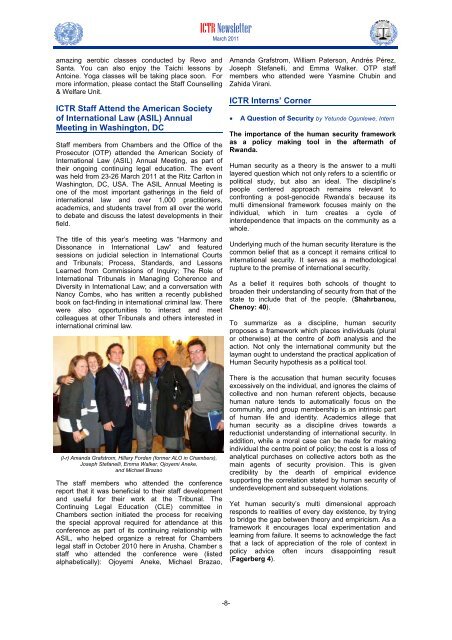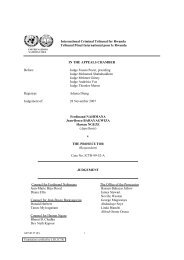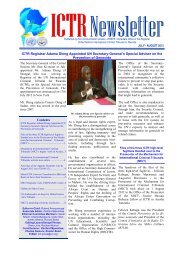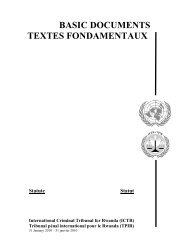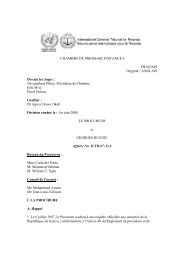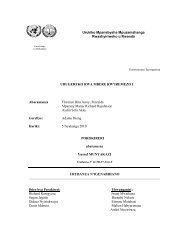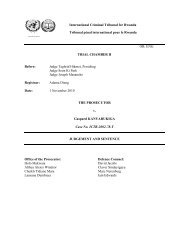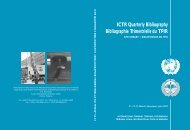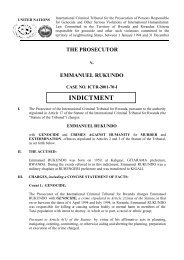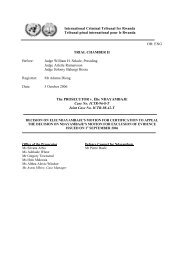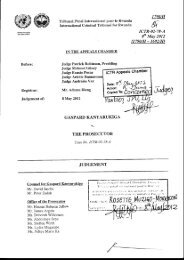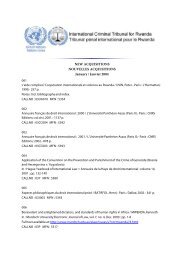Contents - International Criminal Tribunal for Rwanda
Contents - International Criminal Tribunal for Rwanda
Contents - International Criminal Tribunal for Rwanda
You also want an ePaper? Increase the reach of your titles
YUMPU automatically turns print PDFs into web optimized ePapers that Google loves.
ICTR Newsletter<br />
March 2011<br />
amazing aerobic classes conducted by Revo and<br />
Santa. You can also enjoy the Taichi lessons by<br />
Antoine. Yoga classes will be taking place soon. For<br />
more in<strong>for</strong>mation, please contact the Staff Counselling<br />
& Welfare Unit.<br />
ICTR Staff Attend the American Society<br />
of <strong>International</strong> Law (ASIL) Annual<br />
Meeting in Washington, DC<br />
Staff members from Chambers and the Office of the<br />
Prosecutor (OTP) attended the American Society of<br />
<strong>International</strong> Law (ASIL) Annual Meeting, as part of<br />
their ongoing continuing legal education. The event<br />
was held from 23-26 March 2011 at the Ritz Carlton in<br />
Washington, DC, USA. The ASIL Annual Meeting is<br />
one of the most important gatherings in the field of<br />
international law and over 1,000 practitioners,<br />
academics, and students travel from all over the world<br />
to debate and discuss the latest developments in their<br />
field.<br />
The title of this year’s meeting was “Harmony and<br />
Dissonance in <strong>International</strong> Law” and featured<br />
sessions on judicial selection in <strong>International</strong> Courts<br />
and <strong>Tribunal</strong>s; Process, Standards, and Lessons<br />
Learned from Commissions of Inquiry; The Role of<br />
<strong>International</strong> <strong>Tribunal</strong>s in Managing Coherence and<br />
Diversity in <strong>International</strong> Law; and a conversation with<br />
Nancy Combs, who has written a recently published<br />
book on fact-finding in international criminal law. There<br />
were also opportunities to interact and meet<br />
colleagues at other <strong>Tribunal</strong>s and others interested in<br />
international criminal law.<br />
(l-r) Amanda Grafstrom, Hillary Forden (<strong>for</strong>mer ALO in Chambers),<br />
Joseph Stefanelli, Emma Walker, Ojoyemi Aneke,<br />
and Michael Brazao<br />
The staff members who attended the conference<br />
report that it was beneficial to their staff development<br />
and useful <strong>for</strong> their work at the <strong>Tribunal</strong>. The<br />
Continuing Legal Education (CLE) committee in<br />
Chambers section initiated the process <strong>for</strong> receiving<br />
the special approval required <strong>for</strong> attendance at this<br />
conference as part of its continuing relationship with<br />
ASIL, who helped organize a retreat <strong>for</strong> Chambers<br />
legal staff in October 2010 here in Arusha. Chamber s<br />
staff who attended the conference were (listed<br />
alphabetically): Ojoyemi Aneke, Michael Brazao,<br />
Amanda Grafstrom, William Paterson, Andrés Pérez,<br />
Joseph Stefanelli, and Emma Walker. OTP staff<br />
members who attended were Yasmine Chubin and<br />
Zahida Virani.<br />
ICTR Interns’ Corner<br />
• A Question of Security by Yetunde Ogunlewe, Intern<br />
The importance of the human security framework<br />
as a policy making tool in the aftermath of<br />
<strong>Rwanda</strong>.<br />
Human security as a theory is the answer to a multi<br />
layered question which not only refers to a scientific or<br />
political study, but also an ideal. The discipline’s<br />
people centered approach remains relevant to<br />
confronting a post-genocide <strong>Rwanda</strong>’s because its<br />
multi dimensional framework focuses mainly on the<br />
individual, which in turn creates a cycle of<br />
interdependence that impacts on the community as a<br />
whole.<br />
Underlying much of the human security literature is the<br />
common belief that as a concept it remains critical to<br />
international security. It serves as a methodological<br />
rupture to the premise of international security.<br />
As a belief it requires both schools of thought to<br />
broaden their understanding of security from that of the<br />
state to include that of the people. (Shahrbanou,<br />
Chenoy: 40).<br />
To summarize as a discipline, human security<br />
proposes a framework which places individuals (plural<br />
or otherwise) at the centre of both analysis and the<br />
action. Not only the international community but the<br />
layman ought to understand the practical application of<br />
Human Security hypothesis as a political tool.<br />
There is the accusation that human security focuses<br />
excessively on the individual, and ignores the claims of<br />
collective and non human referent objects, because<br />
human nature tends to automatically focus on the<br />
community, and group membership is an intrinsic part<br />
of human life and identity. Academics allege that<br />
human security as a discipline drives towards a<br />
reductionist understanding of international security. In<br />
addition, while a moral case can be made <strong>for</strong> making<br />
individual the centre point of policy; the cost is a loss of<br />
analytical purchases on collective actors both as the<br />
main agents of security provision. This is given<br />
credibility by the dearth of empirical evidence<br />
supporting the correlation stated by human security of<br />
underdevelopment and subsequent violations.<br />
Yet human security’s multi dimensional approach<br />
responds to realities of every day existence, by trying<br />
to bridge the gap between theory and empiricism. As a<br />
framework it encourages local experimentation and<br />
learning from failure. It seems to acknowledge the fact<br />
that a lack of appreciation of the role of context in<br />
policy advice often incurs disappointing result<br />
(Fagerberg 4).<br />
-8-


